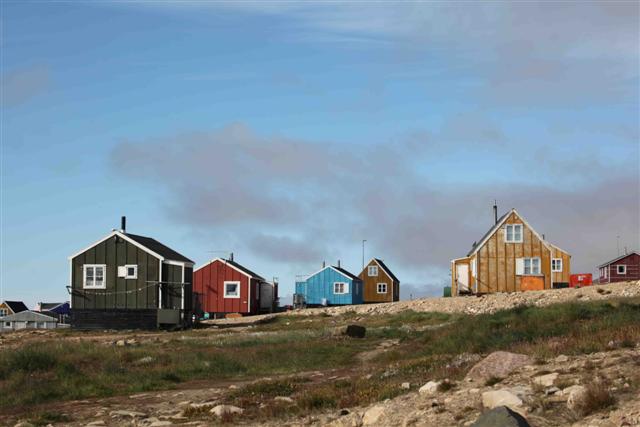Arrival in Qaanaaq
We decided to sail along Herbert Island to the town of Qaanaaq, approx. 35 miles away. There was no wind, but quickly we got into a heavy fog covering the boat and ice bergs. It took two of us to stay on watch all the time to avoid any encounters with ice bergs the size of busses. Slowly the fog lifted and we pushed the engine a bit to get to Qaanaaq.
Our original plan was to travel up to Siorapaluk, the northernmost settlement in Greenland. But we decided that we would rather have more time in Qaanaaq to do community outreach and to prepare the boat for the next leg. And finally Tim feels that there is a fair chance to discover yet another northern salt marsh on the Harward Islands close to the Greenland Ice Sheet. We hope to report on newly discovered salt marshes tomorrow.
Sailing to the Harwards Island might bring other adventures than northern salt marshes as hunters tell us this is the preferred area to hunt narwhal. Mattak – skin and blubber of the narwhal – is a treat eaten raw and the meat is cooked. Three different hunters told us to be careful in there – but we were not sure whether they were concerned with our safety travelling in icy waters or with us getting between whales and hunters.
So far we have not had much luck spotting whales, but sitting on the deck this afternoon we saw seals. They got up to breathe and sea gulls were following their every move, circulating in order to grab any leftover fish.
Qaanaaq lays on the side of range of low mountains offering the town little protection from wind and icebergs in the Inglefield Bredning. The city, which rests on a long, sandy beach, has 600 inhabitants and probably the same number of four-legged inhabitants. During the winter the dogs are used for hunting and fishing on the ice, but during the summer they sit and wait for the cold winter to return.
Realizing that we were late for Saturday shopping, we quickly got the zodiac in the water and set off for our mission: to get fuel and fresh water for the boat, and showers and laundry facilities for the crew.
The town is fairly small and the oil tanks are situated right in the center of everything, so we started there. But people on the beach told us that the Polar Oil tank was closed for the weekend. We found the water station near the beach and filled up our 6 jugs for water stored on deck for extra supplies, but had to leave with empty gasoline jugs. Our skipper however found that we have enough diesel to take us to Harward Islands – and importantly enough back again.
Our next mission was to find showers and laundry. In Kullorsuaq we found a community house where they offered washing and laundry facilities, so we asked around for similar facilities here. There is one in Qaanaaq too, but that too is closed for the weekend. Still with our hopes high, we tracked down the local guesthouse to find the facilities needed. But the landlord there explained that she had had guests staying for nights in a row and that here water tanks were almost empty. We would have to come back after the weekend.
I settled for the last, but not the least refreshing solution. Sascha and I found a stream leading water directly from the glaciers above the town to the beach. We followed the stream up to a quiet place above the town, where I cold finally wash.
Back on the Arctic Tern, we sat on the deck, enjoying the warmth of the sun. Valentine decided to take the kayak into the icy waters. The kayak has travelled with the Arctic Tern all they way from St. Lawrence, Canada to Qaanaaq without being used, but now was the time to launch it. Valentine headed off in the afternoon sun.
